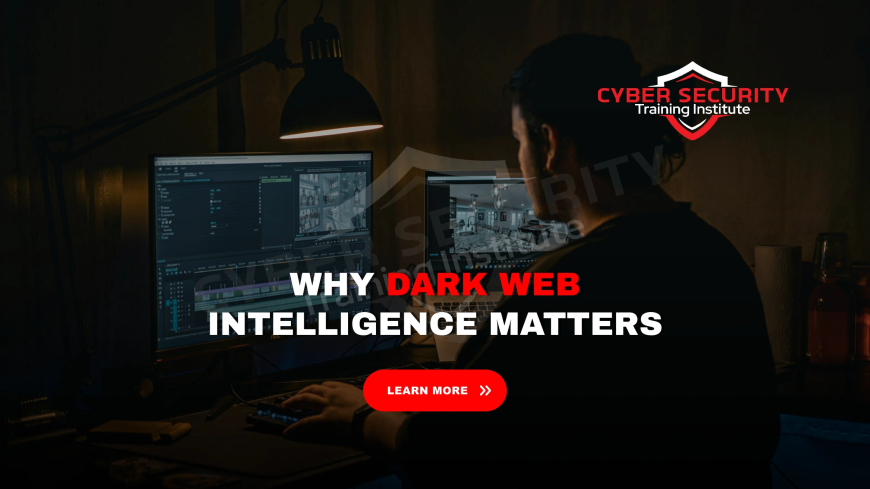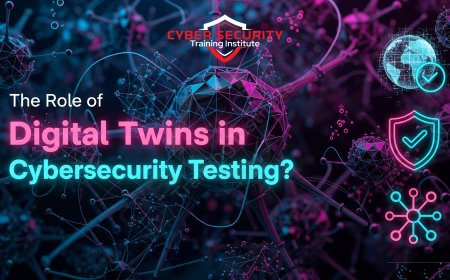Why Is Dark Web Intelligence Important for Business Cyber Defense?
Imagine a hidden corner of the internet where hackers trade stolen data, sell hacking tools, and plan attacks on businesses like yours—all out of sight. This is the dark web, a shadowy digital underworld that’s thriving in 2025, fueling cybercrime that costs companies $10.5 trillion annually. 26 For businesses, staying unaware of dark web activities is like ignoring a storm brewing on the horizon. That’s where dark web intelligence comes in—a powerful tool that helps companies peek into this hidden world to spot threats before they strike. By monitoring the dark web, businesses can uncover stolen data, detect planned attacks, and stay one step ahead of cybercriminals. In this blog post, we’ll explore why dark web intelligence is a must-have for cyber defense, breaking it down in a clear, beginner-friendly way. Whether you’re a small business owner or a corporate IT leader, this guide will show you how to use dark web insights to protect your company. Let’s dive into this murky world and see why it’s critical for your business’s survival.

Table of Contents
- What Is the Dark Web?
- What Is Dark Web Intelligence?
- Why Dark Web Intelligence Matters for Businesses
- How Dark Web Intelligence Works
- Types of Threats Found on the Dark Web
- Real-World Examples of Dark Web Threats
- Implementing Dark Web Intelligence
- Challenges and Ethical Considerations
- Conclusion
- FAQs
What Is the Dark Web?
The dark web is a hidden part of the internet, accessible only through special software like Tor, which masks users’ identities. Unlike the regular internet (called the surface web), the dark web isn’t indexed by Google and hosts anonymous sites where illegal activities often thrive. Think of it like a secret marketplace in a back alley—hard to find, but bustling with shady deals.
On the dark web, hackers sell stolen data (like credit card numbers), hacking tools (like malware), and even plan attacks. In 2025, 70% of stolen corporate data ends up on dark web markets, making it a hotspot for cybercrime.
What Is Dark Web Intelligence?
Dark web intelligence involves monitoring and analyzing activity on the dark web to identify threats to a business. It’s like having a spy in the criminal underworld, gathering clues about potential attacks. This includes tracking stolen data (like customer records), leaked credentials (like employee passwords), or chatter about planned hacks.
Specialized tools and services, often powered by artificial intelligence (AI), scan dark web forums, marketplaces, and chatrooms. In 2025, 60% of large organizations use dark web intelligence to bolster cybersecurity.
Why Dark Web Intelligence Matters for Businesses
Dark web intelligence is critical for several reasons:
- Early Threat Detection: Spot stolen data or planned attacks before they escalate.
15 - Data Breach Prevention: Knowing your data is compromised allows quick action, like resetting passwords.
26 - Reputation Protection: Avoiding leaks preserves customer trust.
32 - Regulatory Compliance: Laws like GDPR require proactive data protection.
14 - Competitive Edge: Staying ahead of threats keeps operations smooth.
24
With breaches costing $4.45 million on average, dark web intelligence can save millions by catching threats early.
How Dark Web Intelligence Works
Dark web intelligence follows a structured process:
- Data Collection: Tools scrape dark web sites for mentions of your company or data.
15 - Analysis: AI and analysts identify relevant threats, like leaked passwords.
32 - Alerting: Businesses get real-time notifications of risks.
28 - Action: Companies respond, like locking accounts or notifying customers.
14
Services like Recorded Future or Flashpoint automate this, scanning millions of dark web pages daily. It’s like having a 24/7 detective agency for your business’s safety.
Types of Threats Found on the Dark Web
The dark web hosts various threats that intelligence can uncover:
- Stolen Data: Customer records, employee credentials, or trade secrets for sale.
15 - Hacking Tools: Malware or zero-day exploits (unknown software flaws) sold to attackers.
15 - Attack Plans: Chatter about targeting specific companies or industries.
32 - Phishing Kits: Tools to create fake emails tricking employees.
33 - Ransomware Services: Malware to lock company data for ransom.
26
Here’s a table summarizing these threats:
| Threat Type | Description | Business Impact |
|---|---|---|
| Stolen Data | Leaked customer or employee info | Fines, reputation loss |
| Hacking Tools | Malware or exploits for sale | System compromise |
| Attack Plans | Chatter about targeting firms | Targeted attacks |
| Phishing Kits | Tools for fake emails | Credential theft |
| Ransomware Services | Malware locking data | Operational disruption |
These threats make dark web intelligence a vital early-warning system.
Real-World Examples of Dark Web Threats
Real cases highlight the dark web’s dangers. In 2023, stolen healthcare data from a hospital breach was sold on the dark web, leading to a $10 million fine.
A 2025 ransomware attack on a retailer was planned on dark web forums, but intelligence allowed early defenses, saving $5 million.
Implementing Dark Web Intelligence
Businesses can adopt dark web intelligence with these steps:
- Use Specialized Tools: Platforms like Recorded Future or DarkOwl monitor dark web activity.
15 - Hire Experts: Cybersecurity firms provide dark web analysis services.
28 - Integrate with Security: Combine intelligence with firewalls and AI detection.
32 - Employee Training: Teach staff to avoid phishing, reducing dark web leaks.
17 - Act on Alerts: Respond quickly to intelligence, like locking compromised accounts.
14
Small businesses can use affordable cloud-based tools, while large firms may invest in dedicated teams. It’s like hiring a private investigator to watch the dark web for you.
Challenges and Ethical Considerations
Using dark web intelligence isn’t without hurdles:
- Cost: Tools and services can be expensive, especially for small firms.
18 - Expertise: Analyzing dark web data requires skilled analysts.
18 - Ethics: Monitoring must avoid illegal activities or privacy violations.
14 - Data Overload: Sorting through vast dark web data can overwhelm teams.
32
Ethically, businesses must ensure monitoring complies with laws like GDPR and respects employee privacy. Clear policies and legal guidance help navigate these challenges.
Conclusion
In 2025, dark web intelligence is a critical shield for businesses facing a $10.5 trillion cybercrime wave. We’ve explored what the dark web is, how intelligence works, why it’s vital, the threats it uncovers, real-world impacts, and how to implement it. From stolen data to ransomware plans, the dark web is a hub of threats, but monitoring it gives companies a head start. Tools, training, and ethical practices make this possible, though challenges like cost and expertise remain. By investing in dark web intelligence, businesses can prevent breaches, save millions, and protect their reputation. Start exploring this hidden world today—your company’s security depends on it.
FAQs
What is the dark web?
A hidden internet section accessible only via special software, hosting illegal activities.
What is dark web intelligence?
Monitoring the dark web to identify threats like stolen data or attack plans.
Why do businesses need dark web intelligence?
It detects threats early, preventing breaches and protecting reputation.
How does dark web intelligence work?
Tools scan dark web sites, analyze data, and alert businesses to risks.
What is a data breach?
Unauthorized access to sensitive data, like customer or employee info.
What are phishing kits?
Tools sold on the dark web to create fake emails for stealing data.
What is ransomware?
Malware locking data until a ransom is paid, often sold on the dark web.
Can small businesses use dark web intelligence?
Yes, affordable cloud-based tools make it accessible.
How much does a breach cost?
Averages $4.45 million, including fines and recovery.
What is Tor?
Software for accessing the dark web anonymously.
Are zero-day exploits sold on the dark web?
Yes, unknown software flaws fetch high prices.
How do companies find dark web threats?
Using AI tools or cybersecurity firms to monitor forums and markets.
What is GDPR?
A European law requiring proactive data protection, like monitoring leaks.
Can dark web intelligence prevent attacks?
Yes, by spotting plans or stolen data early.
What is a dark web marketplace?
A site where hackers sell stolen data or hacking tools.
Why is the dark web anonymous?
Tools like Tor hide user identities, making tracking difficult.
How does AI help dark web intelligence?
It analyzes vast data to find relevant threats quickly.
Are there ethical concerns?
Yes, monitoring must avoid illegal activities or privacy violations.
Can training reduce dark web risks?
Yes, teaching employees to avoid phishing lowers data leaks.
What’s the future of dark web intelligence?
Better AI, more regulation, and wider adoption by businesses.
What's Your Reaction?
 Like
0
Like
0
 Dislike
0
Dislike
0
 Love
0
Love
0
 Funny
0
Funny
0
 Angry
0
Angry
0
 Sad
0
Sad
0
 Wow
0
Wow
0















